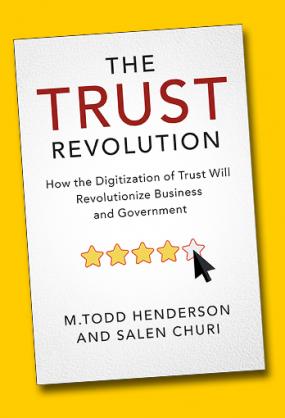Prof. Todd Henderson has spent years at the University of Chicago Law School studying corporations and regulation. When Uber came on the scene, it forced a shift in his thinking; innovation, he realized, was changing the way humans cooperate.
For starters, the popularity of the ride-hailing app seemed to contradict a prevailing narrative about the decline of trust in American society: Sure, people might be losing confidence in government and the media, but millions of times every day they were accepting rides from strangers who hadn’t been vetted by the government taxi commission.

In fact, technology-assisted cooperation had skyrocketed in several areas of public life—people were trading value with Bitcoin, renting houses on Airbnb, and buying stuff from strangers on eBay and Craigslist.
“We are cooperating at levels that would have been unfathomable 50 years ago,” said Henderson, the Michael J. Marks Professor of Law, who has written dozens of articles and books on corporate law and regulation. “We’re at the very genesis, I think, of a really big change.”
Trust wasn’t plummeting, Henderson saw; it was at an all-time high. The market for creating it was merely shifting—in some arenas at least—from centralized institutions to the public at large, thanks to innovative platforms that used algorithms and digital networks to incentivize good behavior and offer consumers oversight, control and even channels for resolving disputes.
It’s a development with enormous potential, Henderson and former Law School colleague Salen Churi argue in a new book,The Trust Revolution: How the Digitization of Trust Will Revolutionize Business and Government. It’s also one that could unleash unprecedented human cooperation, reframe fundamental political debates about the role of government, and lead to a competitive global system of decentralized “microregulators” in which trust is created by the entity best suited to the job.
One feature of that change is something Henderson had never expected to favor: increased regulation.
“Uber actually provides more regulation than the taxi commission,” Henderson said. And that’s what Uber and its competitors sell, Henderson noted: It isn’t rides—drivers sell those—it’s the ability to trust the driver, thanks to systems for rating drivers, mapping rides and resolving disputes.
“We are cooperating at levels that would have been unfathomable 50 years ago. We’re at the very genesis, I think, of a really big change.”
“And I’m OK with that because I’m confident that the amount of regulation is actually linked to the demand for regulation,” he said. “As our society gets richer and more complex, people want more heavily regulated experiences. And this was the big conceptual shift for us: It’s not about there being too much regulation—if anything, there’s too much government regulation—it’s about who provides the regulation. And if we start thinking about regulation in that way, that changes our political debates, too.”
Throughout the book, Henderson, JD’98, and Churi, JD’11, the founder of a venture capital fund that invests in startups operating in heavily regulated industries, link trust and regulation. They note the correlation between high levels of interpersonal trust and the wealth of a society. They also trace the history of trust markets—from medieval guilds to corporate brands to New Deal-era administrative agencies—to illustrate how the channels enabling people to cooperate outside of their family-and-friend networks have changed over time.
For instance, consumers for years have relied on government agencies to protect their interests: certifying the safety of their milk and ibuprofen, licensing their lawyers and beauticians, and regulating their banks and hotels. And those mechanisms have had their place and value, Henderson said.
“We can rethink what our government does to provide trust without attacking it for what it has done to get us to this point,” he and Churi write. But “[w]hat worked at one point in our history does not necessarily work at other points.”
“It’s not about there being too much regulation...it’s about who provides the regulation.”
Henderson believes that, despite the ongoing and inevitable clash between companies like Uber and the government entities with which they compete, traditional regulators may ultimately struggle to keep pace.
“The faster things can move and proliferate, the harder they are to regulate,” he and Churi write.
But that doesn’t mean there won’t be areas in which government regulation is the best option—or that governments shouldn’t be free to compete with microregulators. They simply shouldn’t have the monopoly on regulation, the authors argue, because internet platforms often are more flexible, efficient and democratic. Uber, after all, is just one option right now: If it isn’t meeting needs, riders can switch to Lyft or return to the government-regulated option and hail a yellow cab.
“People say the Bernie Sanders and Donald Trump campaigns [are about giving] power to the people,” Henderson said. “The real power to the people—it’s eBay, it’s Uber.”
—Adapted from an article that first appeared on the Law School website.









